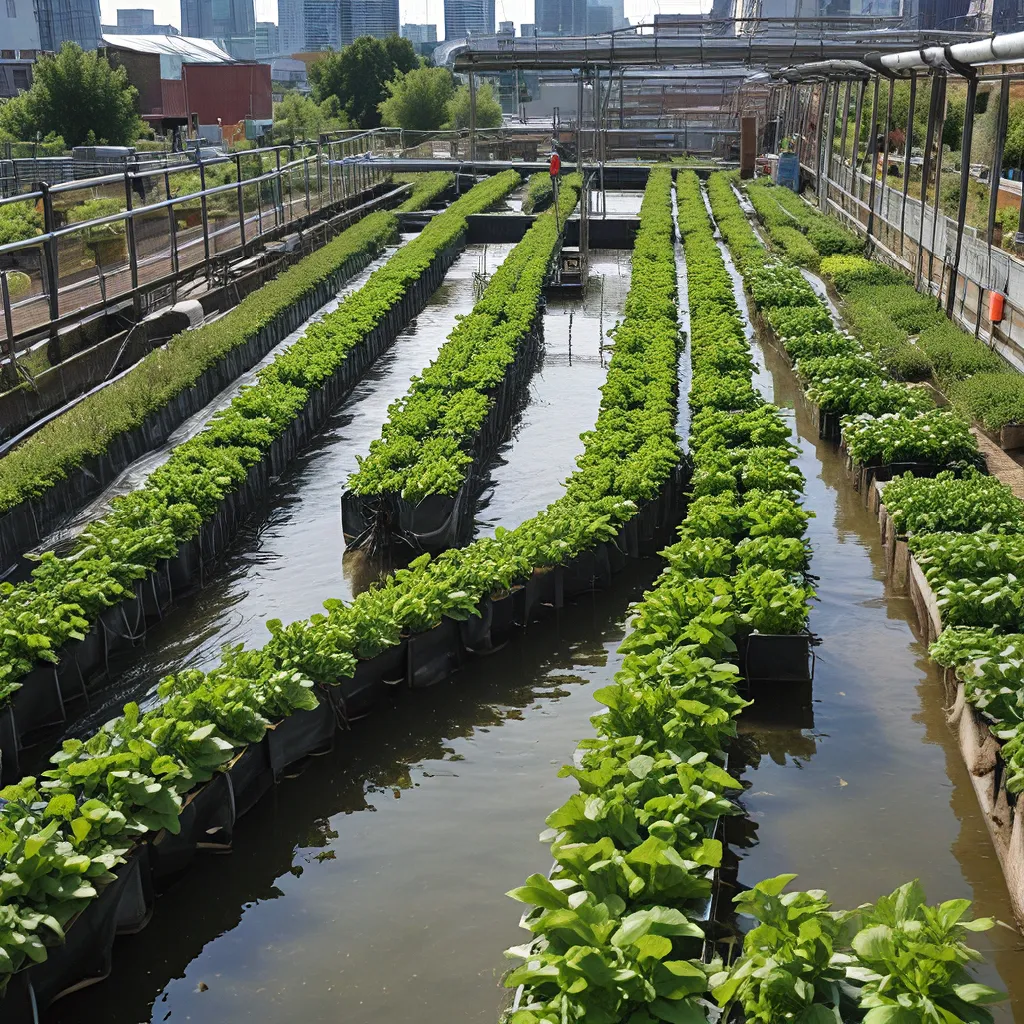
As an environmental enthusiast, I’ve always been fascinated by the intersection of technology, sustainability, and urban living. Today, I want to take you on a journey through the world of wastewater treatment and its remarkable potential to revolutionize the way we approach urban agriculture.
Unlocking the Power of Wastewater
Wastewater is often seen as a byproduct of our daily lives, something to be disposed of and forgotten. But what if I told you that this seemingly mundane resource holds the key to a more sustainable future? That’s precisely what researchers and innovators are discovering as they delve into the realm of wastewater treatment.
Recent studies have highlighted the incredible potential of wastewater to serve as a valuable source of nutrients and water for urban agriculture. By leveraging advanced treatment techniques, we can extract these precious resources and channel them back into our food production systems, creating a closed-loop system that minimizes waste and maximizes efficiency.
Bridging the Gap: Wastewater and Hydroponics
One of the most promising applications of this approach is the integration of wastewater treatment with hydroponics, a method of growing plants without soil. Hydroponics has long been touted as a sustainable alternative to traditional farming, and when combined with wastewater treatment, the potential for resource recovery reaches new heights.
Imagine a world where the very water and nutrients we extract from wastewater are used to nourish the plants in our urban gardens. This symbiotic relationship not only reduces the strain on our freshwater resources but also closes the loop, transforming what was once seen as waste into a valuable commodity.
The Benefits of this Innovative Approach
The benefits of this integrated approach to wastewater treatment and urban agriculture are numerous and far-reaching. By recovering and reusing the nutrients and water from wastewater, we can:
Reduce the Burden on Freshwater Resources: By utilizing wastewater as a source of irrigation and fertilizer, we can alleviate the pressure on our precious freshwater supplies, which are increasingly under strain due to population growth, urbanization, and climate change.
Enhance Food Security: By integrating urban agriculture with wastewater treatment, we can create local food production hubs that provide communities with access to fresh, nutrient-rich produce, improving food security and reducing reliance on distant supply chains.
Foster Sustainability: This approach closes the loop on resource use, minimizing waste and promoting a more sustainable model of urban development. By repurposing wastewater, we can reduce the environmental impact of traditional wastewater disposal methods and contribute to the creation of more resilient and self-sufficient cities.
Boost Economic Opportunities: The integration of wastewater treatment and urban agriculture can also spur economic growth, creating new jobs and business opportunities in the green economy. As cities embrace this innovative approach, they can position themselves as hubs of sustainable innovation and attract investment in this rapidly evolving field.
Overcoming Challenges and Driving Progress
Of course, the successful integration of wastewater treatment and urban agriculture is not without its challenges. Regulatory frameworks, technological barriers, and public perceptions are just a few of the hurdles that must be overcome.
But as with any transformative shift, the rewards far outweigh the risks. Researchers and innovators around the world are actively exploring new ways to streamline the process, improve efficiency, and address public concerns about the safety and acceptability of this approach.
For example, researchers at the University of Southern California have developed a novel wastewater treatment system that combines membrane bioreactor technology with aquaponics, a technique that integrates fish farming with hydroponics. This innovative approach enhances nutrient recovery and water reuse, while also producing high-quality fish and plant-based food.
Similarly, a recent study published in the Sustainability journal highlighted the potential of vertical farming systems that integrate wastewater treatment and hydroponics. These cutting-edge systems not only maximize limited urban land but also demonstrate the feasibility of large-scale commercial application.
As these promising initiatives continue to evolve and gain traction, I’m confident that we’ll see a rapid acceleration in the adoption of this integrated approach to wastewater treatment and urban agriculture. The future is bright, and the possibilities are endless.
Embracing the Future of Sustainable Urban Living
So, what does the future hold for this remarkable intersection of wastewater treatment and urban agriculture? I believe we’re on the cusp of a transformative shift that will redefine the way we think about resource management, food production, and urban sustainability.
As we continue to grapple with the challenges of population growth, climate change, and resource scarcity, the need for innovative solutions has never been more pressing. And the integration of wastewater treatment and urban agriculture offers a glimmer of hope – a pathway to a more sustainable, resilient, and self-sufficient urban future.
By embracing this approach, cities around the world can lead the charge in creating a more circular economy, reducing their environmental footprint, and empowering their citizens to become active participants in the sustainability movement.
So, are you ready to dive into the world of wastewater treatment and urban agriculture? Because I can assure you, the journey ahead is both exciting and essential for the future of our cities and our planet.
Alpha Wastewater is at the forefront of this innovative approach, providing cutting-edge solutions and expert guidance to help communities and businesses unlock the power of wastewater. Explore their services and embark on a sustainable journey with them today.